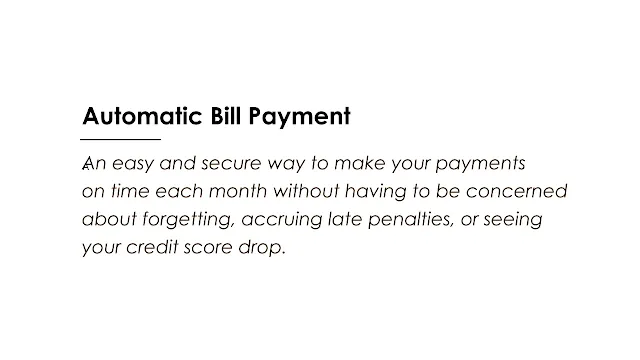 |
| Image: Moneybestpal.com |
Automatic bill payment is an easy and secure way to make your payments on time each month without having to be concerned about forgetting, accruing late penalties, or seeing your credit score drop.
How does automatic bill payment work?
There are two main ways to set up automatic bill payment: through your bank or through your biller.- Through your bank: Recurring payments for your bills can be planned using the online bill payment tool offered by your bank. You must give your bank the biller's name, the account number, the billing address, the payment amount, and the date of the transaction. Then, on your behalf, your bank will send a paper check or an electronic transfer to the biller. Some billers also provide the option to receive e-bills, which are digital versions of your paper bills that you may read and pay on the website or mobile app of your bank.
- Through your biller: Additionally, you can sign up for automatic bill payment through your service provider, such as your utility company, phone provider, insurance provider, or cable provider. Your bank account or credit card details are required, along with your permission to be automatically charged each month. Typically, you can do this via their website, app, or customer service.
What are the pros and cons of automatic bill payment?
Automatic bill payment has many advantages and disadvantages that you should consider before using it. Here are some of them:Pros:
Cons:
- Convenient: It's unnecessary for you to remember to log into numerous websites or applications or pay your payments on time each month. By automating the process, you can save time and hassle.
- Improve credit score: The majority (35%) of your credit score is determined by your payment history. You may raise your credit score and establish a good credit history if you set up automatic bill payments and pay all of your bills on time each month.
- Secure: Online banking and bill payment are often secure and encrypted, guarding your financial and personal information from hackers and identity thieves. Additionally, you won't have to be concerned about misplacing or losing paper checks or bills that you receive in the mail.
- Save money: You can save money by avoiding late fees, interest charges, overdraft fees, and bounced checks. For signing up for automated bill payment, some billers might additionally provide discounts or incentives.
Cons:
- Risk overdraft fees: It's possible that your bank will charge overdraft fees or your biller will charge insufficient funds fees if there isn't enough money in your account to meet the automated payment. If the money is returned or rejected, you can also have to pay further fees.
- Lose track of your spending: If you don't frequently check your credit card or bank account statements, you cannot catch any errors, unauthorized transactions, or adjustments to the amount of your bills. If you don't monitor the amount of money leaving your account each month, you can also overspend or under budget.
- Have less flexibility: Changing the due date or amount of an automatic bill payment could be difficult. If you want to challenge a charge or switch to a different service provider, you can also have trouble halting or canceling the payment.
- Miss out on rewards: You could not get as many points or cash back if you utilize automatic bill payment when using a credit card that offers rewards for specific categories of spending, such as grocery, gas, or vacation. Additionally, if promotional deals or discounts demand manual payments, you can lose out on them.
How to set up automatic bill payments?
If you decide to use automatic bill payment for some or all of your bills, here are some steps you should follow:- Choose which bills you want to pay automatically: Starting with set monthly expenses like rent, a mortgage, a car loan, insurance fees, or subscriptions may be a good idea. Include any payments for utilities, phone, internet, or cable that have varying amounts but are still necessary. For discretionary bills, such as credit cards, streaming services, or online shopping, which are based on your usage or behavior, you might want to avoid using automatic bill payments.
- Choose which method you want to use: Use either the automated payment option provided by your biller or the bill payment service offered by your bank. Choose the solution that best meets your needs and preferences by comparing its features, costs, and ease of use.
- Set up the payment details: Give all the relevant details, including the name of the biller, the account number, the billing address, the payment sum, and the date of the payment. Read the terms and conditions thoroughly and make sure the information is accurate. A payment's due date, processing status, or completion can all be set up as alerts or reminders for you.
- Monitor your account and statements: Regularly check the amount on your credit card or bank account to ensure you have enough money to handle the recurring payments. Every month, check your statements to make sure there are no mistakes, unauthorized charges, or adjustments to the amount of your bills. If you encounter any problems, get in touch with your bank or biller right away to get them fixed.
